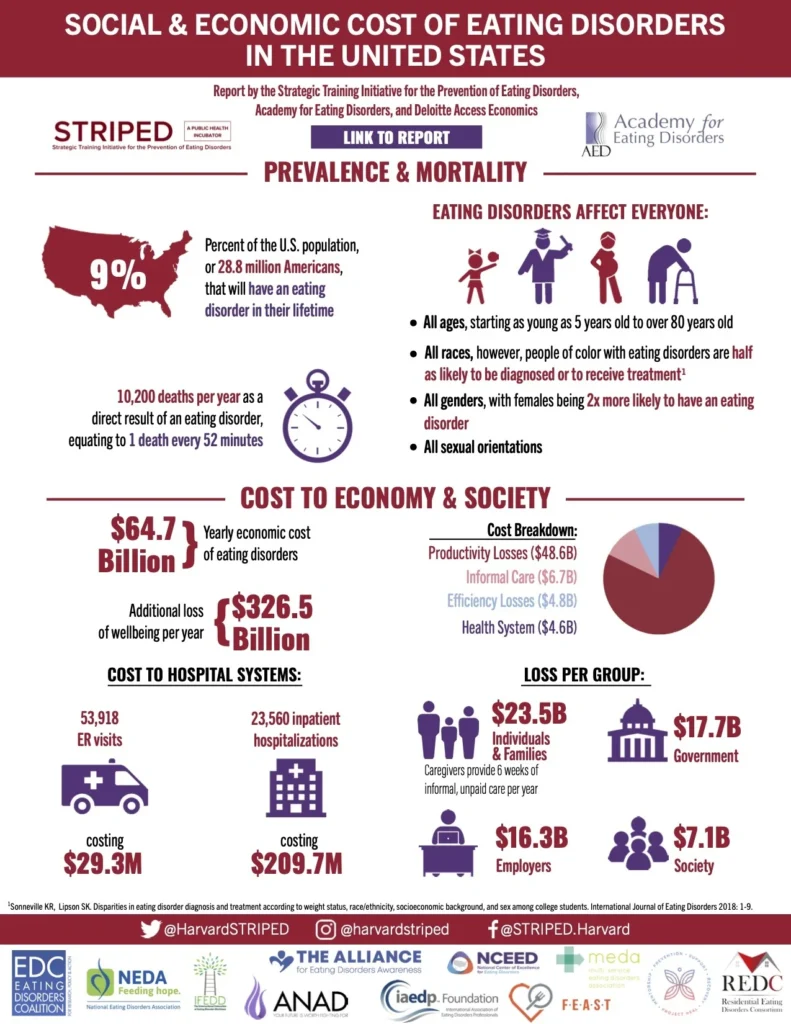menu


14 Common Myths about Eating Disorders Debunked At Last
14 Common Myths about Eating Disorders Debunked At Last
category 4
category 3
category 2
category 1
blog
categories
book your 1:1 call
connect with me
I utilize my own shared recovery experience to provide compassionate recovery care and empower clients to a life of health and wellness.
a Certified Eating Disorder Recovery Coach based in Dallas, Texas.
i'm merrit elizabeth
Looking for information on bulimia specifically?
visit the conquering bulimia blog
Eating disorders are complex mental health conditions that affect millions of people worldwide, yet there remains a significant amount of misinformation and harmful myths surrounding them. As an eating disorder recovery coach, I frequently encounter these misconceptions, which often hinder individuals from seeking the help they need or even recognizing their struggles. From the idea that only young, white women experience eating disorders to the belief that you need to be underweight to have an eating disorder, these myths perpetuate stigmas that prevent open dialogue and create damaging barriers to recovery.
It’s crucial to address and debunk these myths because they not only perpetuate harmful stereotypes but also discourage people from seeking accurate support and effective treatment. In this article, we’ll explore some of the most common myths about eating disorders and shed light on the truth. Understanding the diversity and complexity of eating disorders is the first step toward fostering empathy, promoting accurate knowledge, and encouraging those in need to pursue the help they deserve.
1. Only white women struggle with eating disorders.
People of all races struggle with eating disorders. For so long, only white women have been portrayed as having eating disorders in the media, even though this is hardly an accurate representation. And according to STRIPED, people of color with eating disorders are half as likely to be diagnosed or to receive treatment.
Alishia McCullough is a licensed clinical mental health therapist and author of Reclaiming the Black Body. Her book dives into the overlooked impact of disordered eating among Black women. Her work validates the lived experiences and generational traumas of BIPOC communities. Preorder here!
2. You need to look emaciated to struggle with anorexia. If you appear to have a “normal weight” or “normal body type,” you cannot have an eating disorder.
Less than 6% of people struggling with an eating disorder are medically underweight, according to the Journal of the American Academy of Child & Adolescent Psychiatry. This is often one of the biggest reasons that my clients don’t want to share their struggles with friends, as there is such a strong misconception that being a normal body weight means that you’re “okay.” This is just one of the common myths about eating disorders that create barriers for people seeking help.
3. Anorexia Nervosa is the most common eating disorder.
Another of the common myths about eating disorders is the assumption that anorexia nervosa is the most prevalent. The most common eating disorder is Other Specified Feeding or Eating Disorder (OSFED), this applies to both adolescents and adults and affects both males and females. People diagnosed with OSFED have symptoms that are similar to one or more eating disorders, but may not meet all the criteria for these conditions.
It’s important to understand that eating disorders can look very different, even though they all have an impact on physical health, it doesn’t always look like severe weight loss. Those with OSFED do not have a less severe eating disorder than others.
4. Only young women struggle with eating disorders.
Here’s another one of the common myths about eating disorders that we need to challenge: eating disorders affect individuals of all genders, not just women. While research from STRIPED shows that females are twice as likely to struggle with an eating disorder, it’s crucial to recognize that men also face these challenges. In fact, I’ve personally had numerous men reach out for coaching services, highlighting that eating disorders are not gender-specific.
Men, too, can experience the same struggles with body image, disordered eating, and the emotional toll these conditions take. It’s vital to continue to break the stigma surrounding men and eating disorders so that all individuals, regardless of gender, feel empowered to seek help and support.

5. Only wealthy people struggle with eating disorders.
People of all socioeconomic statuses can struggle. Eating disorders don’t discriminate. According to the article Diseases of affluence? A systematic review of the literature on socioeconomic diversity in eating disorders, “There is no consistent pattern of evidence to suggest a relationship between high SES and ED.”
In addition, according to the article Household food insecurity is associated with binge-eating disorder and obesity from the National Library of Medicine, food insecurity is associated with binge eating disorder, and those with a history of childhood food neglect are more likely to have binge eating disorder, bulimia nervosa, or anorexia nervosa than those without childhood food neglect
6. Eating disorders begin with body dissatisfaction (body image concerns).
Eating disorders don’t always begin with body dissatisfaction. Sometimes it can be due to a lack of interest in eating, a response to a trauma that occurred, difficulty tolerating emotions, etc. In my experience working with many different clients, body dissatisfaction can be a factor but it is not always the biggest issue my client is facing. Everyone has their own unique struggles.
7. Binge eating disorder means you’re out of control around food.
If you are struggling with binge eating disorder, I want you to know that you do not lack self-control. There are many different treatment options for you, and Cognitive Behavioral Therapy with a licensed therapist can be super helpful. Additionally, you may find relief from the feelings of shame by attending a support group. Everyone is different and different treatment options exist!
8. Full recovery is not possible, only lifetime maintenance.
I am fully recovered from an eating disorder, and I personally know many people who are fully recovered as well. We do not have any research or evidence that proves there are specific people who are incapable of achieving full recovery. However, this does not mean that is everyone’s goal. If your recovery goals look different than full recovery, that’s ok too.
9. You need to meet diagnostic criteria in order to struggle with an eating disorder.
I have worked with plenty of clients who have not had a formal diagnosis of an eating disorder, but it was very apparent to both me and their team that they were struggling. It is important to note that not everyone has access to see a provider and receive a formal diagnosis. Your struggle is valid no matter if you have a formal diagnosis or not.
10. Family members should always be involved in treatment.
Family Based Treatment can sometimes be recommended for adolescents struggling with eating disorders. Each situation is unique, and family does not necessarily need to be involved in order to achieve recovery goals. In fact, I have worked with a number of adults who did not want family involved in their treatment and they were able to independently achieve recovery goals with the help of their team.
11. Bulimia Nervosa means that someone engages in self-induced vomiting.
This is a very common misconception. Contrary to popular belief, someone with the diagnosis of bulimia may not be engaging in self-induced vomiting. Purging can also be excessive exercise, laxative abuse, etc. For additional resources on bulimia recovery, check out my online course and comprehensive blog on the Conquering Bulimia website.
12. Avoidant restrictive food intake disorder (ARFID) means you’re a picky eater.
There are a plethora of reasons that ARFID and picky eating are different. Those with ARFID can have a lot of difficulty meeting their nutritional needs due to sensory sensitivities, a lack of interest in food, and feeling anxious about the consequences of eating like vomiting or choking. ARFID is a serious mental illness, and if you are struggling with it, your struggle is valid and you deserve to get the treatment that you need.
As we continue to challenge these common myths about eating disorders, it’s essential to remember that no two cases look alike, and recovery is a deeply individual journey.
13. Only teenage girls struggle with eating disorders.
People of all ages, people of all genders, and people of all sexual orientations struggle with eating disorders. This is not a disease specific to teenage girls. No matter who you are or what eating disorder you are struggling with, there are treatment options for you.
In fact, The National Alliance for Eating Disorders provides a directory of practitioners and treatment centers. There are many different types of providers based on what you’re looking for.
14. Older adults will not get better.
This can be one of the most harmful, yet common myths about eating disorders. There are plenty of older adults who have achieved full recovery later in life. I have also personally worked with people in their 50s and 60s who have achieved major success in recovery.
Moreover, no matter how old you are, recovery is possible!
Conclusion: Common Myths about Eating Disorders Officially Debunked
In conclusion, common myths about eating disorders persist, often making it harder for individuals to seek help or recognize their struggles. These misconceptions—about who can be affected or what recovery looks like—stem from a lack of understanding. By challenging these myths, we can create a more inclusive and supportive environment for those in need. It’s important to remember that eating disorders do not discriminate based on gender, age, race, or body type, and recovery is possible at any stage of life.
If you or someone you know is struggling, resources like the National Eating Disorders Association (NEDA) offer valuable support. Lastly, let’s continue to educate ourselves, break the stigma, and ensure everyone has access to the help they deserve.
Published by Merrit Elizabeth on Nov.11, 2024.

Merrit Elizabeth Stahle is an Eating Disorder Recovery Coach certified by The Carolyn Costin Institute. She holds a master’s degree in Health Promotion Management and a certification in Applied Neuroscience. She is fully recovered from an eating disorder and she has years of experience working with women with eating disorders.
Leave a Reply Cancel reply
next post
previous post
browse categories
read or leave a comment +